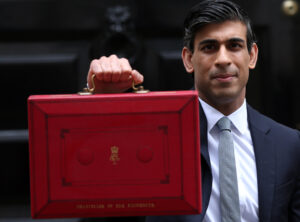Whilst many applauded the Autumn statement announced by Chancellor Rishi Sunak today huge elements of the business economy has been critical about being left out.
Specialist for the self-employed, Qdos CEO, Seb Maley, commented: “There are two ways to view this Budget. On one hand, it’s a relief there are no major tax changes affecting the self-employed. On the other, many will feel the damage has already been done.
“The recently announced social care levy, corporation tax changes in 2023 and IR35 reform have and will hit freelancers, contractors and small business owners hardest. And the cut to business rates, while welcome, won’t be felt by those who work remotely and don’t want or need premises.
“In his speech, the Chancellor was self-congratulatory about the government’s treatment of entrepreneurs. This is now a tired out, unconvincing rhetoric and one that’s falling on deaf ears.
“Sparing the self-employed in this Budget speech doesn’t paper over the cracks. These workers are bearing the brunt of short-sighted, quick-fix tax reforms that endanger this vital cog of the economy, rather than support it.”
Tsewang Wangkang, co-founder and CEO of Embargo said “The hospitality sector’s recovery is far from over – and the Chancellor is right to acknowledge this. Indeed, the 50% discount to business rates and the simplification of alcohol duty will undoubtedly help many businesses to remain on track with their progress plan.
“That said, this is just one piece of the puzzle. Uncertainty surrounding the Government’s ‘Plan B’ restrictions and rising operational costs remain prominent threats to the recovery and growth of many hospitality businesses. The Government should therefore look to go even further with its support to the sector – after all, the changes will only go so far if the Chancellor follows through with the intended VAT return to pre-pandemic levels.
“The hospitality sector’s revival post-Covid remains tentative, and the Government is right not to rock the boat just yet. However, more can and must be done to support the industry. After all, the sector is the UK’s 4th largest employer – it deserves more than a minimum recovery effort.”
Giving her reaction to the Chancellor’s budget, Shevaun Haviland, Director General of the British Chamber of Commerce, said: “There is much to welcome in this Budget for business communities across the UK.
“The Chancellor has listened to Chambers’ long-standing calls for changes to the business rates system and this will be good news for many firms. It will provide much needed relief for businesses across the country, giving many firms renewed confidence to invest and grow.
“Additional investment in skills, infrastructure and better access to finance will be key drivers for our economic recovery and will provide longer-term benefits and opportunities for businesses across the country.
“Businesses have been battered by 18 months of the pandemic and problems around supply chain costs and disruption, labour shortages, price rises, soaring energy bills and taxes, and there may still be difficult months ahead.
“If firms face unexpected bumps in the road, the Chancellor must be prepared to take further action to enable the economy to fire on all cylinders again.”
Commenting on the Budget being more about prosecco than pensions, Nick Ritchie, Director, Wealth Planning at RBC Wealth Management, said: “Buoyed by better than expected economic forecasts, the Chancellor’s statement was more about prosecco than pensions. Private investors will breathe a sigh of relief that feared increases to capital gains tax and a reduction in pension tax relief haven’t materialised. But while paying less for sparkling wine will be welcome news for many, the freezing of income tax thresholds and increase in national insurance announced earlier this year means household incomes continue to be eroded in real terms.
“Individuals should seek advice to understand the impact of rising inflation and interest rates on achieving their financial goals. There are still a number of tools available that can help investors maximise their return on investment at a time when it matters most.”
Other UK small business owners added their comments to the Chancellors announcement:
Ben Crampin, partner at Optimal Compliance: “The additional spending on R&D reliefs is welcome and it is particularly encouraging that the Government is modernising the R&D tax relief schemes by allowing cloud computing and data costs. What we don’t know yet is whether the additional funding will end up in the hands of SME businesses, who are the lifeblood of the UK economy, or if it will be swallowed up by a small number of multinational corporations. For too long there has been an institutional bias on the R&D front, favouring the largest companies over the smallest.”
Julia Kermode, founder at Nantwich-based IWork: “This was the usual pantomime performance of positive propaganda, but beyond the bluster there was very little in real terms to help the millions of self-employed people who are the backbone of the economy. Rishi Sunak said he is “backing business and entrepreneurs” but what about all the small business owners who are themselves in poverty, earning a pittance while prioritising their staff, paying decent wages while going without themselves? When will we see real change to genuinely help these businesses, especially those that have been excluded from COVID financial support? They have been forgotten and left lagging behind.”
Read more:
Sparing self-employed and stamp duty help for hospitality sector doesn’t paper over cracks
















